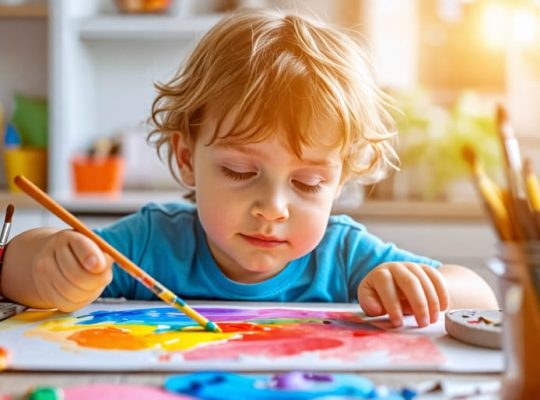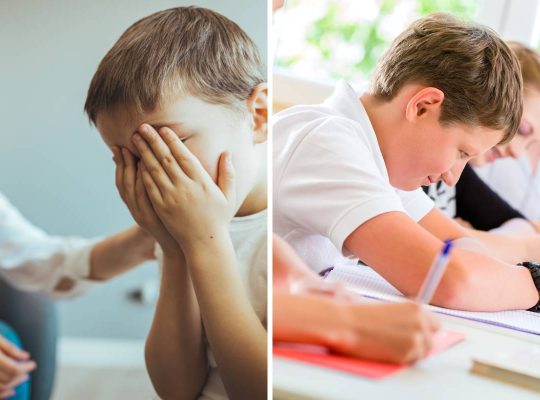Understand that there are many effective types of treatments available for childhood mental health conditions. Psychotherapy, such as cognitive-behavioral therapy (CBT), helps children change negative thought patterns and behaviors. Medications, when prescribed and monitored by a qualified professional, can alleviate symptoms and restore balance. Family therapy strengthens relationships and teaches supportive parenting strategies for the child’s unique needs. With the right combination of evidence-based treatments tailored to your child, recovery is within reach.
Psychotherapy

Cognitive Behavioral Therapy (CBT)
Cognitive Behavioral Therapy (CBT) is a widely used and highly effective treatment approach for various child mental health issues. CBT focuses on the interconnection between thoughts, feelings, and behaviors. Through this structured therapy, children learn to identify and challenge negative or distorted thought patterns that contribute to emotional distress and problematic behaviors. By developing more balanced and realistic ways of thinking, children can improve their emotional well-being and cope better with life’s challenges.
CBT sessions typically involve a collaborative effort between the child and the therapist. Together, they work on developing specific skills and strategies to manage symptoms, such as relaxation techniques, problem-solving skills, and effective communication. CBT is tailored to each child’s unique needs and can be delivered in individual, group, or family settings.
Research has consistently shown that CBT is a highly effective treatment for a range of child mental health concerns, including anxiety disorders, depression, ADHD, and behavioral issues. CBT has been found to produce long-lasting benefits, with many children experiencing significant improvements in their symptoms and overall functioning. By equipping children with valuable coping skills and fostering a more positive outlook, CBT empowers them to navigate life’s challenges with greater resilience and confidence.
Play Therapy
Play therapy is a powerful tool for helping children express their emotions and cope with mental health challenges in a safe, nurturing environment. Through play, children can communicate their feelings, experiences, and struggles in a way that feels natural to them. Trained play therapists use a variety of techniques, such as storytelling, art, and role-playing, to help children explore their inner world and develop healthy coping mechanisms.
Play therapy is particularly effective for children who may struggle to articulate their feelings verbally. By engaging in symbolic play, children can process traumatic experiences, build self-esteem, and learn problem-solving skills. This type of therapy can be used to address a wide range of mental health concerns, including anxiety, depression, ADHD, and behavioral issues.
One of the key benefits of play therapy is that it allows children to feel in control of their healing process. In a world where they may feel powerless, play therapy empowers children to make choices and express themselves freely. Through this process, children can develop a stronger sense of self and build resilience in the face of life’s challenges.

Medication
Medication can play a vital role in treating child mental illness when used in conjunction with other therapies. Several types of medications are commonly prescribed, depending on the specific condition and symptoms. Antidepressants, such as selective serotonin reuptake inhibitors (SSRIs), help regulate mood and alleviate symptoms of depression and anxiety. Stimulants, like methylphenidate, are often used to manage attention deficit hyperactivity disorder (ADHD) by improving focus and reducing impulsivity. For children with bipolar disorder or severe aggression, mood stabilizers and antipsychotics may be recommended to stabilize mood and manage psychotic symptoms.
When considering medication for a child’s mental health, it’s essential to consult with a qualified psychiatrist or pediatrician who can assess the child’s needs and prescribe the most appropriate treatment. Medication dosages for children are typically lower than those for adults, and close monitoring is necessary to ensure safety and effectiveness. Parents should be aware of potential side effects and work closely with their child’s healthcare provider to track progress and make any necessary adjustments.
It’s important to remember that medication is not a standalone solution for child mental illness. A comprehensive treatment plan often includes a combination of medication, psychotherapy, and other supportive interventions tailored to the child’s specific needs. Open communication between parents, healthcare providers, and the child is key to ensuring a successful treatment journey. With the right support and care, children with mental health challenges can learn to manage their symptoms, build resilience, and thrive.
Family Therapy
Family therapy is a powerful approach that recognizes the significant role family dynamics play in a child’s mental well-being. By involving the entire family in the treatment process, therapists can help strengthen bonds, improve communication, and create a supportive environment for the child’s recovery. In family therapy sessions, family members learn to understand and express their feelings, develop healthy coping mechanisms, and work together to resolve conflicts. Therapists may use various techniques, such as role-playing, art therapy, or guided discussions, to facilitate open and honest communication among family members.
Family therapy is particularly beneficial when a child’s mental health issues stem from or impact family relationships. For example, if a child is struggling with anxiety due to a parental divorce or a sibling’s illness, involving the family in therapy can help address the root causes and provide a safe space for healing. By fostering a supportive and understanding home environment, family therapy empowers the child and their loved ones to navigate challenges together, ultimately promoting long-term mental health and well-being.

School-Based Interventions
For children struggling with mental health issues, schools can play a vital role in providing support and accommodations. Many schools offer counseling services with trained professionals who can help students navigate challenges, develop coping skills, and build resilience. These counselors work closely with parents, teachers, and healthcare providers to create individualized plans that address each child’s unique needs.
In addition to counseling, schools may provide academic accommodations to help students manage their symptoms and succeed in the classroom. This could include extra time on tests, quiet spaces for breaks, or modified assignments. By collaborating with families and mental health professionals, schools can create a supportive environment that promotes both academic and emotional well-being.
Social-emotional learning (SEL) programs are another way schools support mental health. These programs teach children important life skills such as managing emotions, setting goals, and building healthy relationships. By incorporating SEL into the curriculum, schools help students develop the tools they need to thrive both in and out of the classroom.
For students with more intensive needs, some schools offer specialized programs or classrooms that provide targeted support. These programs often have smaller class sizes, trained staff, and therapeutic activities designed to help students build skills and manage their symptoms. By creating a safe and nurturing environment, these programs can make a significant difference in the lives of children facing mental health challenges.
Ultimately, school-based interventions are an essential part of a comprehensive approach to child mental health. By working together, families, schools, and healthcare providers can ensure that every child has the support they need to thrive.
Complementary and Alternative Medicine (CAM)
Complementary and alternative medicine (CAM) refers to non-traditional treatments that may supplement conventional therapies for mental health conditions. While research on the effectiveness of CAM for child mental health is limited, some families find these approaches beneficial when used in conjunction with evidence-based treatments. Examples of CAM include herbal remedies, nutritional supplements, mind-body practices like yoga and meditation, and creative arts therapies such as music or art therapy.
It’s important to note that CAM should not replace proven treatments like psychotherapy and medication. Additionally, some alternative therapies may interact with prescription medications or have side effects. Parents considering CAM for their child’s mental health should consult with their healthcare provider to ensure safety and appropriate integration with conventional care. Open communication about all treatments being used is key to coordinated and effective care.
Ultimately, the decision to incorporate complementary and alternative approaches into a child’s mental health treatment plan is a personal one that should be made in collaboration with qualified professionals. With careful consideration and guidance, CAM may offer additional support and healing options for some children and families navigating mental health challenges.
Residential or Inpatient Treatment
For children with severe mental health issues, residential or inpatient treatment may be necessary. These intensive programs provide 24/7 care in a structured, supportive environment. Children live at the treatment facility for a period of time, typically a few weeks to several months, depending on their needs.
During residential treatment, children receive comprehensive care from a team of mental health professionals, including psychiatrists, psychologists, therapists, and nurses. They participate in individual therapy, group therapy, and family therapy sessions to address their specific challenges. Medication management is also an important aspect of inpatient care.
In addition to therapy, residential programs offer educational support to ensure children don’t fall behind academically. They also provide recreational activities and life skills training to promote overall well-being and development.
Inpatient treatment is usually recommended when a child’s mental health issues are severe enough to require constant supervision and intensive intervention. This may include situations where the child is a danger to themselves or others, or when outpatient treatments have not been effective.
While the decision to pursue residential treatment can be difficult for families, it can be a crucial step in helping children with severe mental health issues stabilize, develop coping skills, and work towards lasting recovery.
Conclusion
In conclusion, there are several effective treatment options available for children and adolescents struggling with mental health issues. Psychotherapy, including cognitive-behavioral therapy and family therapy, can help young people develop coping skills, improve communication, and work through emotional challenges. Medications, when prescribed and monitored by a qualified healthcare professional, can also be a valuable tool in managing symptoms and supporting overall well-being.
It’s important to remember that every child’s needs are unique, and what works for one may not work for another. School-based interventions, such as individualized education plans and counseling services, can provide additional support and accommodate specific learning and emotional needs. Some families may also choose to explore complementary and alternative medicine approaches, like art therapy or mindfulness practices, as part of a comprehensive treatment plan.
If you are concerned about your child’s mental health, don’t hesitate to reach out for help. Talk to your pediatrician, a mental health professional, or your child’s school counselor to discuss your options and find the best path forward for your family. With the right support and individualized care, children can learn to manage their mental health challenges, build resilience, and thrive. Remember, seeking help is a sign of strength, and you are not alone in this journey.







